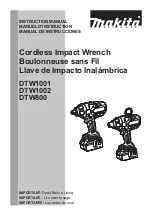
a) Do not dismantle, open or shred secondary battery pack.
b) Do not expose battery pack to heat or fire. Avoid storage in direct sunlight.
c) Do not short-circuit battery pack. Do not store battery pack haphazardly in a box or
drawer where they may short-circuit each other or be short-circuited by other metal objects.
d) Do not remove battery from its original battery pack enclosure required for use.
e) Do not subject battery pack to mechanical shock.
f ) In the event of leaking, do not allow the liquid to come in contact with the skin or eyes. If contact has
been made, wash the affected area with copious amounts of water and seek medical advice.
g) Do not use any charger other than that specifically provided for use with the equipment.
h) Observe the plus (+) and minus (–) marks, battery and equipment and ensure correct use.
i ) Do not use any battery pack which is not designed for use with the equipment.
j ) Do not mix battery pack with different manufacture, capacity, size or type within a device.
k) Keep battery pack out of the reach of children.
l) Seek medical advice immediately if battery pack has been swallowed.
m) Always purchase the correct cell or battery for the equipment.
n) Keep battery pack clean and dry.
o) Wipe the battery pack terminals with a clean dry cloth if they become dirty.
p) Secondary battery pack need to be charged before use. Always use the correct charger and refer to
the manufacturer’s instructions or equipment manual for proper charging instructions.
q) Do not leave a battery pack on prolonged charge when not in use.
r) After extended periods of storage, it may be necessary to charge and discharge the cells or battery pack
several times to obtain maximum performance.
s) Secondary battery pack give their best performance when they are operated at normal room
temperature (20 °C ± 5 °C).
t) Retain the original product literature for future reference.
Safety instructions for battery pack
English
4




























